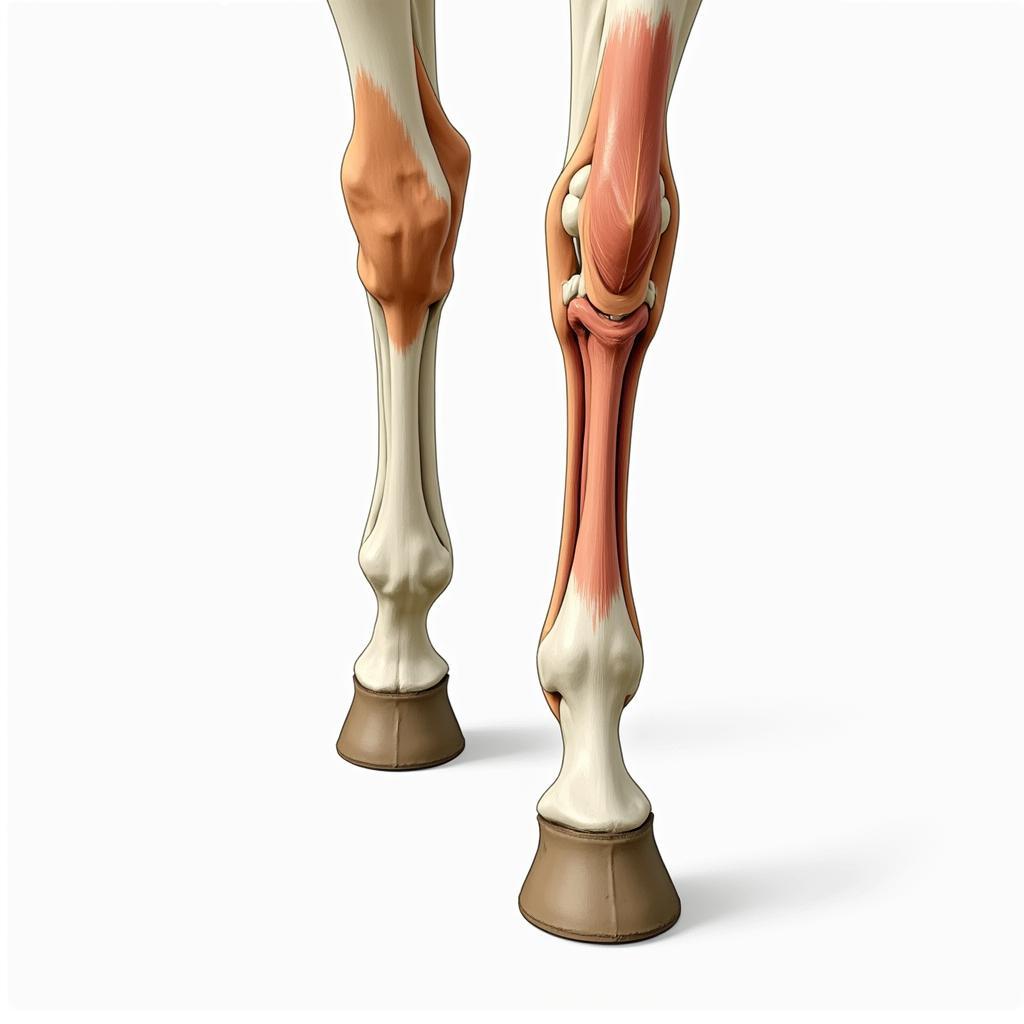Joint health is crucial for a horse’s mobility and overall well-being. As horses age, or if they engage in strenuous activity, their joints can experience wear and tear. This is where Good Joint Supplements For Horses come into play. These supplements are formulated to support healthy cartilage, reduce inflammation, and ease joint stiffness, helping your equine companion stay active and comfortable.
Understanding the Importance of Equine Joint Health
Joints are like shock absorbers, allowing your horse to move fluidly and effortlessly. However, just like any frequently used structure, they are susceptible to damage over time. Factors such as genetics, age, conformation, and workload can all contribute to joint issues in horses.
 Horse Joint Anatomy
Horse Joint Anatomy
What are Joint Supplements for Horses?
Joint supplements are specially designed formulas that contain a blend of ingredients aimed at supporting healthy joints in horses. These ingredients work synergistically to:
- Protect Cartilage: Cartilage acts as a cushion between bones, preventing friction. Joint supplements often contain Glucosamine and Chondroitin Sulfate, which are building blocks of cartilage.
- Reduce Inflammation: Inflammation is a natural response to injury or stress, but chronic inflammation can damage cartilage. Ingredients like MSM (Methylsulfonylmethane) and Hyaluronic Acid help manage inflammation in joints.
- Improve Joint Lubrication: Hyaluronic Acid is a key component of synovial fluid, which lubricates joints. Supplements containing Hyaluronic Acid can help improve joint mobility and range of motion.
Choosing the Right Joint Supplement for Your Horse
With a wide array of joint supplements available, selecting the most suitable one for your horse can seem daunting. Here are some key factors to consider:
- Age and Activity Level: Young, active horses may benefit from supplements that support healthy cartilage development, while older horses or those with existing joint issues might require formulas with higher concentrations of anti-inflammatory and lubricating ingredients.
- Ingredients: Look for supplements with scientifically-backed ingredients like Glucosamine, Chondroitin Sulfate, MSM, and Hyaluronic Acid. Consider your horse’s specific needs and consult your veterinarian to determine the appropriate dosage and combination of ingredients.
- Quality and Reputability: Opt for supplements from reputable brands with strict quality control measures. Look for products manufactured in facilities that adhere to Good Manufacturing Practices (GMP) to ensure purity and potency.
Remember, joint supplements are not a substitute for proper veterinary care. If your horse is showing signs of joint pain, such as stiffness, lameness, or reluctance to move, it’s crucial to consult your veterinarian for a diagnosis and tailored treatment plan.
Can I Give My Horse Amino Acid Supplements for Joints?
Yes, certain amino acids play a vital role in supporting joint health and can be beneficial additions to your horse’s diet. You can learn more about the benefits of amino acid supplements for horses in our comprehensive guide.
Signs Your Horse May Benefit from Joint Supplements
While it’s always advisable to consult your veterinarian for personalized advice, here are some common signs that your horse might benefit from joint supplements:
- Stiffness: Noticeable stiffness, especially after periods of rest or in colder weather.
- Decreased Range of Motion: Difficulty performing certain movements or a reduced range of motion in their joints.
- Lameness or Reluctance to Move: Exhibiting signs of lameness, limping, or being hesitant to move freely.
- Changes in Gait or Performance: Alterations in their usual gait, such as a shortened stride, or a decline in performance.
“Early intervention is key,” says Dr. Emily Carter, DVM, an equine veterinarian with over 20 years of experience. “Providing joint support before significant deterioration occurs can make a substantial difference in your horse’s long-term joint health and mobility.”
Maintaining Overall Joint Health in Horses
In addition to joint supplements, several factors contribute to maintaining optimal joint health in horses:
- Balanced Diet: Ensure your horse receives a balanced diet with adequate vitamins and minerals.
- Appropriate Exercise: Regular, controlled exercise helps maintain joint flexibility and strength. However, avoid overexertion, especially in young or older horses.
- Weight Management: Maintaining a healthy weight minimizes stress on joints.
- Hoof Care: Regular farrier visits for proper hoof trimming and shoeing are essential for even weight distribution and joint alignment.
Joint health is vital for your horse’s well-being and ability to enjoy an active life. By understanding the role of good joint supplements for horses, recognizing potential signs of joint issues, and implementing proactive care strategies, you can help your equine companion enjoy many years of comfortable movement and soundness.
FAQs About Joint Supplements for Horses
Q: How long does it take for joint supplements to work in horses?
A: It typically takes several weeks to a few months of consistent supplementation to observe noticeable improvements in your horse’s joint health.
Q: Can I give my horse joint supplements along with other medications?
A: Always consult your veterinarian before starting your horse on any new supplements, especially if they are currently on medications.
Q: Are there any side effects of joint supplements for horses?
A: Joint supplements are generally safe for horses when administered as directed. However, some horses may experience mild digestive upset, such as loose stools, especially when first starting a new supplement.
Q: Can I give my horse human joint supplements?
A: No, never give your horse human joint supplements. These products may contain ingredients that are toxic to horses or in dosages that are not safe for equine consumption.
Q: Are there any joint supplements specifically designed for horses with hock pain?
A: If you suspect your horse may be experiencing signs of hock pain in horses, it’s crucial to consult with your veterinarian for a proper diagnosis and treatment plan.
For more information on keeping your horse healthy and happy, explore our other informative articles or contact us directly.
Need help with horse care? Reach out to Justus Horses USA!
Phone: 0772127271
Email: [email protected]
Address: QGM2+WX2, Vị Trung, Vị Thuỷ, Hậu Giang, Việt Nam
We’re here to support you and your equine companion’s journey together.